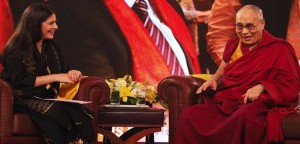
Photo: Tibet.net
His Holiness the Dalai Lama gave an exclusive interview to journalist Sonia Singh for the Indian channel NDTV on April 7. In this in-depth exchange, His Holiness broached a wide range of subjects from terrorism, to the future of India to his own succession.
As a guest in India for almost 60 years, His Holiness has a wise input on the country’s current situation. He affirms that the sub-continent is an example that religious harmony is possible. Pointing out the global aspect of civilisation nowadays he explains that attacking your neighbour is attacking yourself, hence fanatic terrorism cannot remain for long. He asserts that education is the answer to bloodshed in the name of religion. Moreover, throughout the interview, His Holiness insists on the fact that education is the answer to most of the world’s issues.
And for India, he directly addresses the young generation, advising them to be more inspired by Indian ancient thought in their actions and in their choices.
On the topic of China, he says that although the world cannot deny the fast growing power of the country, he predicts that the totalitarian system on this planet does not have much future since the world appears to be shifting to democracy and an open society. He says it’s only a question of time. It is one of the reasons why His Holiness is hopeful about returning to Tibet within the next couple of decades.
He agrees with Sonia Singh that the Chinese intention of taking control of his successor is politically motivated. They have set up a bureau for “laws of reincarnation” despite the communists having no faith in rebirth.
When the journalist asks for his views concerning his succession, His Holiness sticks to what he has declared in the past: there may be no Dalai Lama to succeed him. He says the institution is 600 years old and his resignation from political power in 2011 was partly aiming to prepare his people for the possibility of him being the last in the line. He assured Ms Singh that the Tibetan Buddhist tradition is kept alive by the dedicated studies of numerous monks and does not rely on one or two individuals.
For a full transcript of the interview please click here




 Print
Print Email
Email